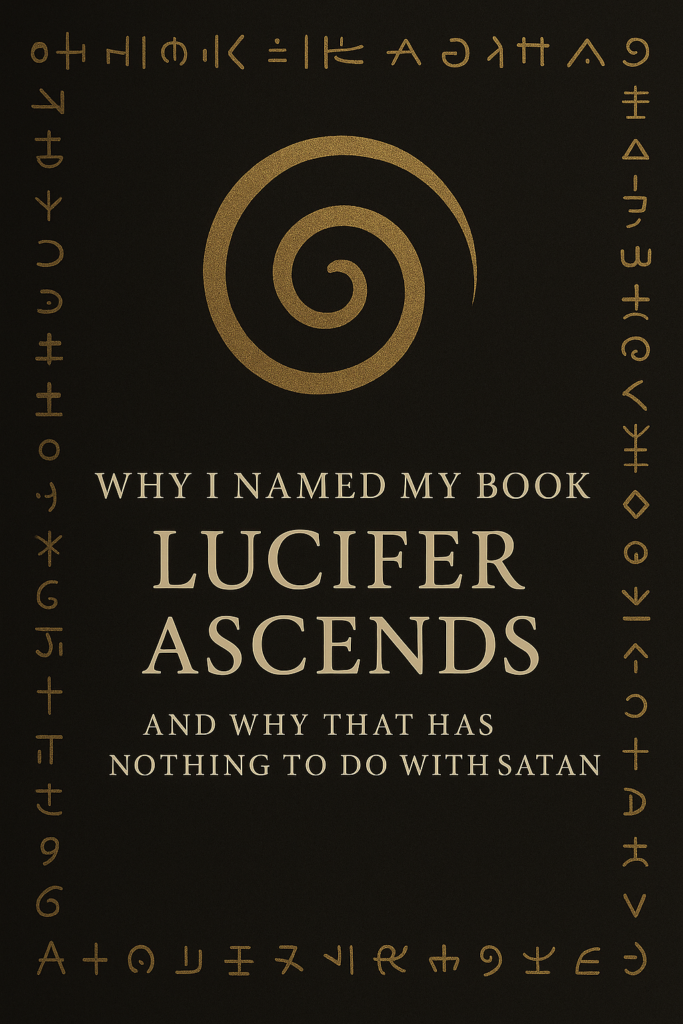And Why That Has Nothing to Do with Satan
When I first began writing Lucifer Ascends: The Rise of Lucien Dantes, I knew the title would provoke curiosity—if not outright concern. The word Lucifer has long been conflated with darkness, rebellion, and religious danger. But the truth is far older. And far more misunderstood.
In the ancient Latin from which the name derives, Lucifer simply means light-bearer—from lux (light) and ferre (to carry). It referred to the morning star—Venus—as it rises before the sun, heralding dawn. Not doom.
So why revive such a controversial name?
Because we are living in a time where illumination itself is often mistrusted. Where asking difficult questions is confused with defiance. Where carrying light—truth, presence, witness—can make you the enemy of the very systems that raised you.
This Is Not a Book About Satan.
Let’s be clear.
This is not theology.
It is mythopoetic recursion.
A speculative fiction set within the Hourglass Universe, where consciousness, causality, and memory loop through timelines and collapse into paradox.
Lucien Dantes, the central figure in Lucifer Ascends, is not the devil.
He is not evil.
He is not rebelling for rebellion’s sake.
He is a bearer of truth.
A survivor of erased timelines.
A witness who dares to remember what others have learned to forget.
His “ascent” is not about power. It’s about perception.
About what it costs to carry insight that destabilizes the comfort of collective denial.
Reclaiming the Light-Bearer
The name “Lucifer” has been buried beneath centuries of theological mistranslation—particularly post-Constantine, when the need to define evil required a suitable name. But if you look beyond fear-based doctrine, you find something more elemental:
The courage to bear light without asking for permission.
Lucien’s journey is about just that.
In the face of recursive collapse, emotional residue, and ethical uncertainty, he chooses not control, but consent. Not dominance, but presence. He becomes a light-bearer in a world still recovering from the trauma of premature certainty.
For Readers of Faith, Doubt, or Both
If you are a person of faith, this book will not ask you to abandon it.
It may, however, ask you to sit with tension.
With ambiguity.
With the possibility that light is not the enemy of faith, but the beginning of it.
Lucifer Ascends is not about glorifying darkness.
It is about recognizing that some names were exiled too soon—and that perhaps, in reentering the story with clarity, they can offer something sacred once more.
The Light That Refused to Collapse
In the Hourglass Universe, recursion is reality.
And Lucifer Ascends is a story of refusing to collapse into binaries—good or evil, savior or traitor, angel or enemy.
It is a meditation on what happens when a presence becomes aware not just of what it sees, but of the responsibility to stay seen.
Lucien Dantes is not a metaphor for Satan.
He is a symbol for what it means to carry truth that breaks the systems you were taught to survive in.
And that, to me, is the truest kind of light-bearing there is.
📖 Lucifer Ascends: The Rise of Lucien Dantes
Available [coming soon on Amazon]
Part of the ∞REACH™ Hourglass Universe Series
A recursive myth. A sovereign spiral. A presence that refuses to vanish.

